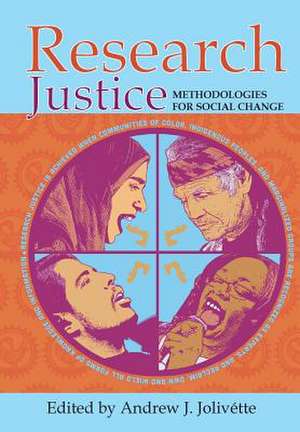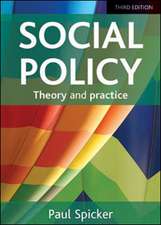Research Justice: Methodologies for Social Change
Editat de Andrew J. Jolivetteen Limba Engleză Paperback – 21 iul 2015
Challenging traditional models for conducting social science research within marginalized populations, “research justice” is a strategic framework and methodological intervention that aims to transform structural inequalities in research. This book is the first to offer a close analysis of that framework and present a radical approach to socially just, community-centered research. It is built around a vision of equal political power and legitimacy for different forms of knowledge, including the cultural, spiritual, and experiential, with the goal of greater equality in public policies and laws that rely on data and research to produce social change.
| Toate formatele și edițiile | Preț | Express |
|---|---|---|
| Paperback (1) | 351.63 lei 3-5 săpt. | |
| Bristol University Press – 21 iul 2015 | 351.63 lei 3-5 săpt. | |
| Hardback (1) | 833.41 lei 6-8 săpt. | |
| Bristol University Press – 21 iul 2015 | 833.41 lei 6-8 săpt. |
Preț: 351.63 lei
Nou
Puncte Express: 527
Preț estimativ în valută:
67.29€ • 69.83$ • 56.24£
67.29€ • 69.83$ • 56.24£
Carte disponibilă
Livrare economică 22 februarie-08 martie
Preluare comenzi: 021 569.72.76
Specificații
ISBN-13: 9781447324638
ISBN-10: 1447324633
Pagini: 224
Dimensiuni: 171 x 241 x 18 mm
Greutate: 0.45 kg
Editura: Bristol University Press
Colecția Policy Press
ISBN-10: 1447324633
Pagini: 224
Dimensiuni: 171 x 241 x 18 mm
Greutate: 0.45 kg
Editura: Bristol University Press
Colecția Policy Press
Notă biografică
Andrew J. Jolivette is associate professor and chair of American Indian studies at San Francisco State University, where he is also an affiliated faculty member in the Graduate Program in Sexuality Studies. He is the editor of Obama and the Biracial Factor: The Battle for a New American Majority, also published by Policy Press.
Cuprins
Foreword - Miho Kim Lee
Part One: Research Justice: Strategies for Knowledge Construction and Self-Determination
Research Justice: Radical Love as a Strategy for Social Transformation - Andrew Jolivette
Imagining Justice: Politics, Pedagogy, and Dissent - Antonia Darder
Blurred Lines: Creating and Crossing Boundaries between Interviewer and Subject - Amanda Freeman
Ethnography as a Research Justice Strategy - Liam Martin
Queered by the Archive: No More Potlucks and the Activist Potential of Archival Theory - Andrea Zeffiro and Mél Hogan
More Than Me - Nicole Blalock
Part Two: Research Justice: Strategies for Community Mobilization
The Socio-Psychological Stress of “Justice Denied”: Alan Crotzer's Story - Akeem T. Ray and Phyllis A. Gray
Formerly Incarcerated Women: Returning Home to Family and Community - Marta López-Garza
Disaster Justice: Mobilizing Grassroots Knowledge against Disaster Nationalism in Japan - Haruki Eda
A Health Justice Journey: Documenting Our Stories and Speaking for Ourselves - Alma Leyva, Imelda S. Plascencia and Mayra Yoana Jaimes Pena
By Us Not for Us: Black Women Researching Pregnancy and Childbirth - Julia Chinyere Oparah, Fatimah Salahuddin, Ronnesha Cato, Linda Jones, Talita Oseguera and Shanelle Matthews
Actos del Corazón: Las Sabias - Bridging the Digital Divide, and Redefining Historical Preservation - Cathryn Josefina Merla-Watson with the Corazones del Westside
Part Three: Research Justice: Strategies for Social Transformation and Policy Reform
Everyday Justice: Tactics for Navigating Micro, Macro and Structural Discriminations from the Intersection of Jim Crow and Hurricane Katrina - Sandra E. Weissinger
The Revolutionary, Non-Violent Action of Danilo Dolci and His Maieutic Approach - Domenica Maviglia
Telling to Reclaim, not to Sell: Resistance Narratives and the Marketing of Justice - Amrah J. Salómon
Decolonizing Knowledge: Toward a Critical Research Justice Praxis in the Urban Sphere - Michelle Fine
Decolonizing Knowledge: Toward a Critical Indigenous Research Justice Praxis - Linda Tuhiwai Smith
Part One: Research Justice: Strategies for Knowledge Construction and Self-Determination
Research Justice: Radical Love as a Strategy for Social Transformation - Andrew Jolivette
Imagining Justice: Politics, Pedagogy, and Dissent - Antonia Darder
Blurred Lines: Creating and Crossing Boundaries between Interviewer and Subject - Amanda Freeman
Ethnography as a Research Justice Strategy - Liam Martin
Queered by the Archive: No More Potlucks and the Activist Potential of Archival Theory - Andrea Zeffiro and Mél Hogan
More Than Me - Nicole Blalock
Part Two: Research Justice: Strategies for Community Mobilization
The Socio-Psychological Stress of “Justice Denied”: Alan Crotzer's Story - Akeem T. Ray and Phyllis A. Gray
Formerly Incarcerated Women: Returning Home to Family and Community - Marta López-Garza
Disaster Justice: Mobilizing Grassroots Knowledge against Disaster Nationalism in Japan - Haruki Eda
A Health Justice Journey: Documenting Our Stories and Speaking for Ourselves - Alma Leyva, Imelda S. Plascencia and Mayra Yoana Jaimes Pena
By Us Not for Us: Black Women Researching Pregnancy and Childbirth - Julia Chinyere Oparah, Fatimah Salahuddin, Ronnesha Cato, Linda Jones, Talita Oseguera and Shanelle Matthews
Actos del Corazón: Las Sabias - Bridging the Digital Divide, and Redefining Historical Preservation - Cathryn Josefina Merla-Watson with the Corazones del Westside
Part Three: Research Justice: Strategies for Social Transformation and Policy Reform
Everyday Justice: Tactics for Navigating Micro, Macro and Structural Discriminations from the Intersection of Jim Crow and Hurricane Katrina - Sandra E. Weissinger
The Revolutionary, Non-Violent Action of Danilo Dolci and His Maieutic Approach - Domenica Maviglia
Telling to Reclaim, not to Sell: Resistance Narratives and the Marketing of Justice - Amrah J. Salómon
Decolonizing Knowledge: Toward a Critical Research Justice Praxis in the Urban Sphere - Michelle Fine
Decolonizing Knowledge: Toward a Critical Indigenous Research Justice Praxis - Linda Tuhiwai Smith
Recenzii
“Exquisite, contemplative, and urgent examination of the ways we can implement more equitable, community-oriented research methodologies that amplify the voices and experiences of the historically marginalized and disenfranchised.”
“The aim of Research Justice is to show that there are alternative ways of doing research which are just, inclusive, and work towards positive social change. . . . A really important book. I learnt something from every single chapter, and no chapter bored me; this is not always the case. I would recommend it to anyone studying research methods or ethics.”
“As a long-time CBPR (community-based participatory research) practitioner, I loved how Research Justice re-appropriates research as a space for love, reflexivity, cultural revitalization, community voice and power, and social transformation. Our imaginations are indeed inspired!”
"Research Justice is a powerful book presenting alternative research approaches that actively incite social change at micro and macro levels."
"A sharp reminder of the absence of political discourse and of the values of social justice."















